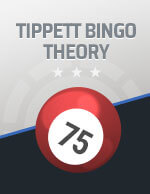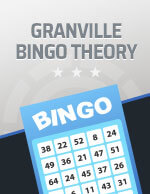- Slots
- Video Poker
- Bingo
- Keno
- Instant-play games
- Hefty welcome bonus
- Round-the-clock live chat
- Cryptocurrencies accepted
- Slots
- Video Poker
- Bingo
- Keno
- Huge Bingo Game Selection
- US Player-Friendly
- Great Promotion Selection
- Loyalty Program Available
- Slots
- Video Poker
- Bingo
- Keno
- Great Selection of Bingo Games
- No Deposit Bonus
- Accepts Crypto Payments
- 24/7 Customer Support

Who Were L.H.C. Tippett and Joseph E. Granville?
One of the people who took the time to develop a simple bingo strategy was Leonard Henry Caleb Tippett, a statistician from England known for publishing several books, inventing the random number table, and contributing to the field of statistics with numerous theories.
During his lifetime, Tippett was the president of the Manchester Statistical Society as well as the president of the Royal Statistical Society. He also won several awards, such as the Guy Medal in Silver of the Royal Statistical Society and the Shewhart Medal of the American Society for Quality Control.
Another guy whose name might be familiar to bingo players is Joseph Ensign Granville, a financial writer from the US. In his time, he presented investment seminars and invented the concept of OBV (on-balance volume), an indicator showing the price and volume relation in the stock market.
Tippett and Granville used their expertise in statistics and finance to develop systems for increasing winning chances in bingo. We’ll get into those strategies and explain how you can apply them to online bingo games.
Tippett and Granville Bingo Theories and Strategies Explained
Although they were experts in different fields, Tippett and Granville both believed their knowledge could help bingo players increase their winning chances. Below you can read about each strategy and decide which one sounds more logical.
Tippett Bingo Theory
 L.H.C. Tippett developed a strategy for playing 75-ball bingo. According to him, if more balls are drawn within a single game, the numbers are more likely to be close to the median. In case you don’t know, the median represents the middle of a set, and in the collection of numbers from one to 75, the median would be 38.
L.H.C. Tippett developed a strategy for playing 75-ball bingo. According to him, if more balls are drawn within a single game, the numbers are more likely to be close to the median. In case you don’t know, the median represents the middle of a set, and in the collection of numbers from one to 75, the median would be 38.
On the other hand, with fewer balls drawn, the called numbers will more likely be closer to the ends of the given range. Therefore, in 75-ball bingo, the numbers called will be closer to one and 75 and further away from 38.
To determine whether the game will feature more or less called numbers, you should know which bingo title you’re playing. In some 75-ball games, players must hit a classic line, which can be done relatively quickly. In others, however, you must hit a particular pattern to win, which usually takes a bit longer.
To sum the theory up, here’s what you should do:
- When a game requires you to hit a standard line, it’ll be shorter, so you should pick tickets with numbers closer to one and 75.
- When a game requires you to hit a particular pattern, it’ll last longer, so you should pick tickets with numbers closer to the median.
Granville Bingo Theory
 Joseph Granville came up with a bingo theory that’s still one of the most popular worldwide. He pointed out that, at the beginning of each game, every number in a bingo draw has the same chance of being called.
Joseph Granville came up with a bingo theory that’s still one of the most popular worldwide. He pointed out that, at the beginning of each game, every number in a bingo draw has the same chance of being called.
Granville also believed that the ratio of odd and even, as well as high and low numbers, must be balanced. Furthermore, he claimed that randomness applies to the ending of your numbers. If your card contains the number five, you shouldn’t also have numbers 15, 25, or other numbers ending with five but rather choose numbers ending with different digits like 1, 2, 3, 4, 6, 7, 8, 9, and zero.
In other words, if you use the Granville bingo strategy to increase your winning chances, your bingo ticket should:
- Have as much diversity in numbers as possible;
- Feature a balance between odd/even and high/low numbers;
- Contain numbers with different end digits.
Can You Win Using These Bingo Strategies?
Tippett and Granville’s bingo strategies can help you increase your chances of winning, but neither of them is a foolproof method. If you use them correctly, you may be closer to a win as they are based on principles from math and statistics.
Nevertheless, don’t forget that bingo is a game of chance with random outcomes and that no strategy can bring you a huge prize every time.
Conclusion
Tippett and Granville developed strategies to help bingo players increase their chances of winning. So, if you play bingo regularly but haven’t had any luck, try either or both of these theories, and you may soon end up with a winning ticket.



